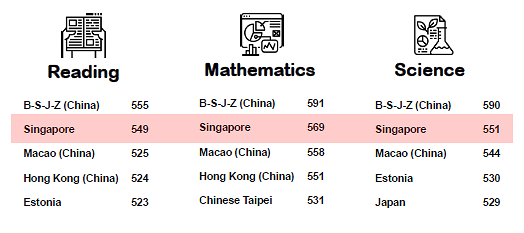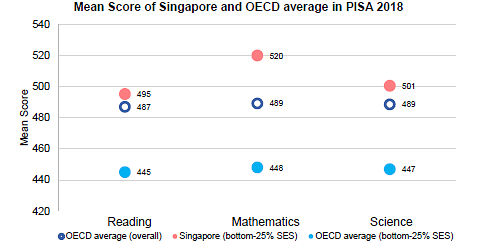SINGAPORE: Fifteen-year-old students in Singapore ranked second globally in reading, mathematics and science, after China, according to a 2018 international benchmarking study co-ordinated by the Organisation for Economic Cooperation and Development (OECD).
They were also “well equipped with critical skills” and resilient – qualities that would “serve them well” in a rapidly changing world, findings from the Programme for International Student Assessment (PISA) showed.
These students were were able to integrate content, reason and make inferences, as well as identify evidence to support their claims, thus communicating them effectively, according to PISA.
Commenting on the findings, the Ministry of Education (MOE) said in a media release that Singapore’s 15-year-olds “have demonstrated competencies that would enable them to navigate the challenges of the future”.
The study, whose findings were released on Tuesday (Dec 3), is conducted once every three years and measures how well 15-year-olds around the world make use of their knowledge to solve problems.
In Singapore, 6,300 students from all 153 public secondary schools and 376 students from 13 randomly selected private schools took part in the assessment.
They placed second in reading, mathematics and science, among 79 education systems. China, represented by four provinces – Beijing, Shanghai, Jiangsu and Zhejiang – topped the table.

Singapore’s 15-year-olds placed second across the three subjects. (Graphic: MOE)
Singapore’s performance in PISA 2015 and 2018. (Graphic: MOE)
Singapore took first place in all three categories in 2015. China was represented by Beijing, Shanghai, Jiangsu and Guangdong that year.
Singapore’s mean performance for reading saw a “marked improvement” in 2018. The students also maintained a strong performance in mathematics and science.
Singapore also has one of the highest proportions of top performers achieving the top two proficiency levels in the three subjects. These top performers are able to “apply well-developed thinking and reasoning skills to complex problems”, said MOE.
The strong performance can be attributed to well-resourced schools, supportive teachers and students being well-supported at home, the ministry added.
STUDENTS FROM LOWER-INCOME HOMES PERFORMED BETTER THAN OECD AVERAGE
Students from homes in the bottom quarter socio-economic status not only outperformed students in the equivalent band across the OECD, but also performed better than the average for all three subjects.

Students from homes in the bottom quarter socio-economic status performed better than the OECD average for all three subjects. (Graphic: MOE)
The study revealed that socioeconomically advantaged students in Singapore outperformed disadvantaged students in reading by 104 points in PISA 2018. This is larger than the average difference of 89 points between the two groups across OECD countries.
In addition, about 10 per cent of disadvantaged students here scored in the top quarter of reading performance in Singapore, “indicating that disadvantage is not destiny”, said the report.
“MOE will continue to direct more resources to schools with greater needs, including schools with more low-progress learners or financially needy students, to ensure that access to education is not a barrier to students’ learning,” said the ministry.
SCORES UP BUT INTEREST IN READING DOWN
Compared to 2015, Singapore students showed improved reading scores, according to PISA.
Fewer students enjoyed reading, despite a “marked improvement” in reading scores. (Graphic: MOE)
An increase in the proportion of 15-year-old students from English-speaking homes from 49 per cent in 2015 to 57 per cent in 2018 contributed to the improved reading scores, said MOE.
“Our education system provides a strong literacy foundation in primary schools. The secondary English Language curriculum builds on that foundation and emphasises the development of critical reading skills and ability to respond to a diverse range of multimodal and dynamic texts,” the ministry explained.
Despite the improved reading scores, Singapore students enjoyed reading less compared to 2009. The students were asked questions on their attitudes towards reading, which includes both online reading and books.
MOE said the decline in enjoyment of reading could be due to students spending more time on other activities such as surfing the Internet or using social media platforms.
FEAR OF FAILURE
In the 2018 assessment, Singapore students also expressed a greater fear of failure.
About 72 per cent of 15-year-olds here said they worry about what others think of them when they are failing, above the OECD average of 56 per cent.

Singapore students expressed a greater fear of failure, and were worried about what others might think of them if they failed. (Graphic: MOE)
In almost every education system including Singapore, girls expressed greater fear of failure than boys and this gender gap was “considerably wider” among top-performing students, said the report.
The education ministry noted that most of the 15-year-olds who participated in PISA 2018 were in Secondary 4 and would have sat for their O- and N-Levels last year.
Their fears “could stem from the desire to do well in national examinations”, said MOE.
With the new PSLE scoring system from 2021, MOE hopes to “encourage students to move away from an overemphasis on academic results”. The roll-out of full subject-based banding and the removal of academic streams in secondary schools by 2024 will also encourage students to “adopt a growth mindset and take greater ownership of their learning”.
“I think we can help more students to view such setbacks as a natural part of learning and growing, and to view them constructively and use them as opportunities for learning and growth,” said Mr Sng Chern Wei, deputy director-general of education (curriculum) at MOE.
“I think this will allow more of them to try new things and be confident of learning from experiences.”




